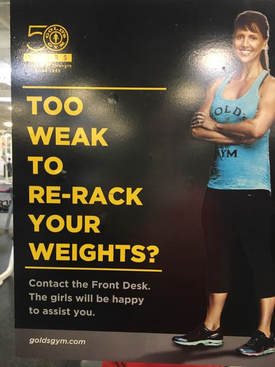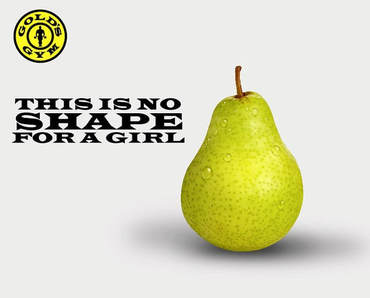fragile masculinity at gold's gym
August 11, 2017
It is 2017 and Gold’s Gym has a poster up near the free weight area that states “Too Weak to Re-Rack Your Weights? Contact the Front Desk. The girls will be happy to assist you.” In the poster, a woman in athletic wear stands with her arms crossed, smiling. The message is clear — do you really need a “girl” (read: woman) to help you? If so, what kind of pathetic man are you?
One would imagine that such signage got approval from several people at the Gold’s Gym corporate office. One can envision a Don Draper-type sitting there giving approval to this text. Yes, this sounds like a great idea — let’s shame men for not putting weights back by saying that even “girls” can do it. That will surely teach them not to be so “weak.” Crackerjack work, team! A day’s work well done! At no point did corporate apparently ever say, “Hey, maybe this is really missing the mark in 2017.” It was approved, printed, distributed and displayed.
Substitute another group in this message and would it be funny? If the poster said “Too weak to re-rack your weights? Contact the Front Desk. The (fill-in-the-blank — Old veteran? Cancer patient? Person whose legs have been amputated?) will be happy to help you.” Is that funnier? Or suddenly not so funny anymore and now disrespectful, odd and inappropriate?
Shaming men by saying even girls might be more powerful or stronger than them isn’t funny or cheeky. It’s reductive and sexist. It is the epitome of “fragile masculinity” — men being shamed at the mere thought that women might be more powerful than them.
This isn’t the first time Gold’s Gym has been in the news for sexist advertising. Just last year they were under fire for an ad purportedly on display at a location in Egypt that showed a photo of a pear with the text “This is no shape for a girl.” Their corporate-issued apology saying how appalled they were and how much they value women was “too little, too late” for many people. And yet even after that incident, Gold’s Gym still doesn’t “get it” regarding how to speak about and how to portray women. Grown women are consistently referred to as “girls” and their value is demeaned or mocked. There was nothing learned from the “this is no shape for a girl” incident. If there were, they would have realized that the “Too weak to rack your weights” poster is just as problematic.
Substitute another group in this message and would it be funny? If the poster said “Too weak to re-rack your weights? Contact the Front Desk. The (fill-in-the-blank — Old veteran? Cancer patient? Person whose legs have been amputated?) will be happy to help you.” Is that funnier? Or suddenly not so funny anymore and now disrespectful, odd and inappropriate?
Shaming men by saying even girls might be more powerful or stronger than them isn’t funny or cheeky. It’s reductive and sexist. It is the epitome of “fragile masculinity” — men being shamed at the mere thought that women might be more powerful than them.
This isn’t the first time Gold’s Gym has been in the news for sexist advertising. Just last year they were under fire for an ad purportedly on display at a location in Egypt that showed a photo of a pear with the text “This is no shape for a girl.” Their corporate-issued apology saying how appalled they were and how much they value women was “too little, too late” for many people. And yet even after that incident, Gold’s Gym still doesn’t “get it” regarding how to speak about and how to portray women. Grown women are consistently referred to as “girls” and their value is demeaned or mocked. There was nothing learned from the “this is no shape for a girl” incident. If there were, they would have realized that the “Too weak to rack your weights” poster is just as problematic.
How does one counter such sex and gender shaming tactics? Perhaps weightlifters who are secure in their masculinity (and/or femininity) should earnestly start going up to the front desk and ask for the help that this poster advertises. Over and over again, ask for help in putting your weights back. Marvel out loud about how wonderful this service is because yes, after lifting, you DO kinda feel too weak to put your weights back on your own and, yes, those “girls” at the front desk are a great help. Take their words literally. Don’t let Gold’s Gym dictate what masculinity or femininity is. Their version of masculinity is apparently the absence of weakness. If that’s not your definition of masculinity, vote with your feet. There are lot of other gyms out there that would be happy to respectfully speak about men and women without using one group to shame another. Men’s power isn’t zero sum — if a woman can do it too, it doesn’t negate or make the man weak in contrast. Yet we’re thrown back to a machismo definition of masculinity with this poster. Is that the kind of gym you want to give your business to?
Of course, Gold’s Gym certainly has the right to run their business however they please — even with this sexist messaging. It may anger those who feel it is not politically correct, and others will roll their eyes at those who find real offense in this. From a business standpoint though, one would hope that Gold’s Gym executives would be smart enough to realize that women are a segment of their customer base. It doesn’t seem like a great business decision to capitalize on sexist tropes that trivialize women’s power — especially when women coming to the gym are specifically trying to increase their bodily health and strength. Is it the best strategy to mock their power in posters like this? Or are they betting that women will not bat an eyelash at this poster because this ideology is so ingrained in how we culturally have spoken about men and women for far too long?
This isn’t creative — it’s derivative. It’s a cliché that ran its course a long time ago. Reductive, sexist tropes won’t bring a business into the future — it will only hobble it.
Of course, Gold’s Gym certainly has the right to run their business however they please — even with this sexist messaging. It may anger those who feel it is not politically correct, and others will roll their eyes at those who find real offense in this. From a business standpoint though, one would hope that Gold’s Gym executives would be smart enough to realize that women are a segment of their customer base. It doesn’t seem like a great business decision to capitalize on sexist tropes that trivialize women’s power — especially when women coming to the gym are specifically trying to increase their bodily health and strength. Is it the best strategy to mock their power in posters like this? Or are they betting that women will not bat an eyelash at this poster because this ideology is so ingrained in how we culturally have spoken about men and women for far too long?
This isn’t creative — it’s derivative. It’s a cliché that ran its course a long time ago. Reductive, sexist tropes won’t bring a business into the future — it will only hobble it.


